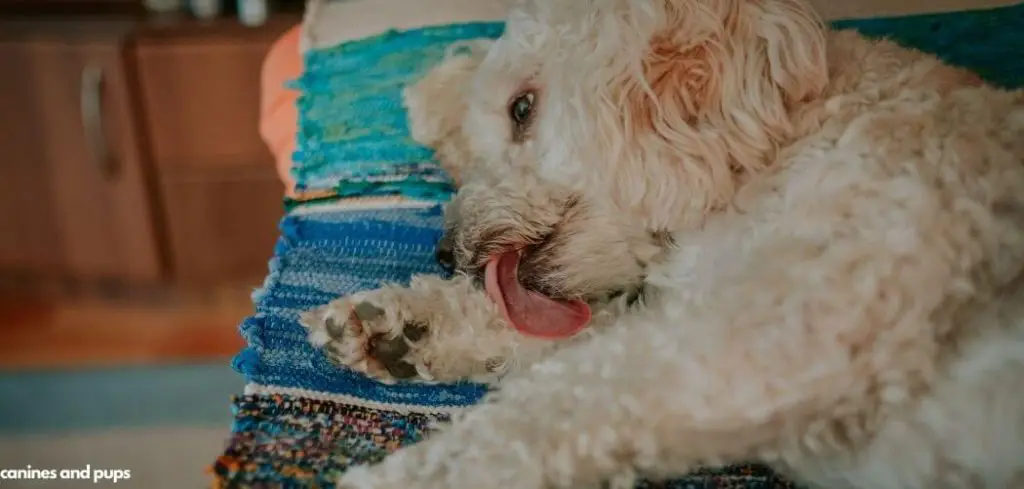Dogs licking and hiccuping excessively can be concerning for any pet owner. These behaviors may indicate an underlying health issue that needs attention.
We outline the common reasons why a dog may excessively lick and hiccup, what you can do at home, and when to seek veterinary help.
Dog Excessively Licking and Hiccuping — Why It Happens
Excessive licking and hiccuping in dogs can occur due to a variety of physical and behavioral causes. Common reasons include gastrointestinal irritation, stress or anxiety, and oral discomfort, while sometimes it may result from more serious conditions like nausea or digestive disorders.
Puppies may also develop hiccups more frequently due to their immature diaphragms, whereas older dogs might show these signs when underlying health issues emerge.

Dog Excessively Licking and Hiccuping: Common Causes
Gastrointestinal Upset
Gastrointestinal upset is a common reason dogs lick and hiccup excessively. When the stomach is irritated, dogs may attempt to soothe it by licking their lips or paws.
Hiccups can arise from stomach spasms or acid reflux, particularly after eating too quickly.
Owners might notice vomiting, drooling, or a sudden change in appetite alongside these behaviors.
Addressing digestive upset is important because prolonged discomfort can lead to dehydration and nutritional imbalances.
Read more: Dog Excessively Licking and Swallowing (Causes and solutions)
Anxiety and Stress
Dogs often respond to stress or anxiety through repetitive behaviors such as licking or vocalizing.
Hiccuping can also occur as part of a stress response due to changes in breathing patterns.
Situations like separation from owners, loud noises, or environmental changes can trigger these responses. Signs of anxiety include pacing, panting, and excessive grooming.
Chronic stress in dogs can affect overall health, making it important to manage and reduce anxiety triggers.
Oral Pain or Discomfort
Issues like dental disease, mouth sores, or foreign objects stuck in the mouth can prompt dogs to lick excessively.
This behavior is an instinctive attempt to relieve pain or remove irritants. Hiccups may accompany discomfort due to altered swallowing or irritation of the esophagus.
Owners might notice bad breath, difficulty eating, or pawing at the mouth. Oral health is critical because untreated conditions can lead to infections and systemic problems.
Nausea
Nausea is a significant contributor to excessive licking and hiccuping. Dogs may lick surfaces, lips, or their paws to cope with queasiness.
This can result from motion sickness, dietary indiscretion, or medication side effects.
Observing signs such as drooling, retching, or lethargy can indicate the presence of nausea.
Promptly addressing nausea is vital to prevent dehydration and worsening of the underlying cause.
Gastroesophageal Reflux (GERD)
Gastroesophageal reflux can irritate the esophagus and stomach, leading to both licking and hiccups. Acid reflux may occur after meals or when a dog lies down too soon after eating.
Owners might notice frequent swallowing, regurgitation, or discomfort when the abdomen is touched.
Persistent reflux can damage esophageal tissue, so it is important to manage both symptoms and underlying causes.
Respiratory Irritation
Although less common, respiratory irritation such as a mild infection or throat inflammation can cause hiccuping alongside licking behaviors.
Dogs may lick their lips or paws as a self-soothing mechanism. Other signs include coughing, sneezing, or nasal discharge.
Respiratory issues should be evaluated to prevent secondary infections or chronic airway irritation.
What to Do If Your Dog Is Dog Excessively Licking and Hiccuping
Observe your dog’s behavior closely and keep track of the frequency and triggers. Adjust feeding habits by providing smaller, more frequent meals and slowing down rapid eaters.
Keep the environment calm to reduce stress, and offer interactive toys or gentle play to distract from repetitive licking.
Monitor for any signs of oral discomfort and maintain regular dental care, including professional cleanings. Ensure your dog stays hydrated and consult a vet if you notice persistent changes in appetite or activity level.
When to Call or Visit Your Vet
Immediate veterinary attention is needed if your dog shows persistent vomiting, lethargy, or difficulty breathing.
Blood in vomit or stool, significant weight loss, or sudden behavioral changes also warrant a prompt vet visit. Oral injuries, severe dental pain, or foreign objects in the mouth should be examined without delay.
Chronic hiccups accompanied by other health issues may indicate gastrointestinal or systemic diseases that require professional diagnosis and treatment.
Read more: Dog Licking Excessively Licking (Learn why it happens)
Key Takeaway
Excessive licking and hiccuping in dogs can stem from a range of issues, from mild digestive upset to anxiety or oral pain.
Observing the pattern and accompanying signs is crucial to understanding the cause.
Providing appropriate care at home and seeking veterinary guidance when necessary ensures that your dog remains comfortable and healthy. Early intervention can prevent minor issues from developing into serious health problems, reinforcing the importance of attentive pet care.
